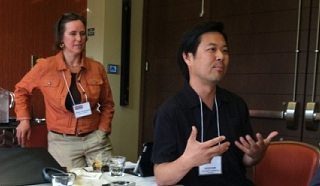This blog post was authored by HEFN Director Kathy Sessions.
How can environmental health and justice values and voices have more impact in the democratic process? That question keeps weaving through threads of conversation among HEFN members. It is more often being integrated into their grantmaking. And it led me to attend the spring convening of the Funders Committee on Civic Participation (FCCP) from May 7-9 in San Antonio, Texas. Here are a few of my takeaways for HEFN and its funder community from the convening.
Demography is our friend. I was surprised at how often issues of health, environment, and justice were mentioned by speakers talking about their civic engagement work. But I shouldn’t have been surprised. We know the public generally resonates with the kinds of concerns motivating HEFN members’ grantmaking – like health hazards in people’s everyday surroundings, or the right of communities to have a voice in decisions that affect their health and well-being. And researchers on demographic and electoral trends regularly report that values of health, environmental protection, and equity resonate with the emerging majority electorate that includes voters of color, young people, and women.
Health, environmental, and justice issues are motivating civic engagement. Several presentations at the FCCP convening mentioned HEFN-relevant issues as focal points of civic engagement work. A panel facilitated by Sarah Christiansen (Solidago Foundation) highlighted climate justice organizing in California, New Mexico, and Virginia.
Speakers as varied as a national reproductive rights group and a Texas voter engagement collaborative pointed to strong public interest in accessing health care as a motivation for focusing civic engagement outreach on Affordable Care Act implementation. Several presenters cited neighborhood conditions as the trigger for community action. An Ohio civic engagement organizer said they are responding to the hundred-plus “organically grown” citizen groups concerned about fracking impacts on their local communities.
Powerful numbers isn’t (necessarily) power. One striking issue across several presentations was the disconnects between the apparent interests of the eligible electorate and current political power. Texas, for example, along with NM, CA, AZ and DC, is already majority-minority in population, but voter participation rates are much lower among Texas voters of color. Some of the most inspiring speakers I heard in San Antonio placed these realities, as well as ongoing struggles over issues like voter suppression and immigration reform, in the context of historical civil rights and pro-democracy movements. Convening speakers also talked about money in politics as a major obstacle to progress on specific issues, as well as to the authentic translation of public will into public policy. Issues related to money in politics are a contemporary concern as well to the HEFN community’s work to address threats from toxics and dirty energy.
Partnership possibilities. I saw a few HEFN members at the FCCP meeting, including from the Groundswell Fund, Jessie Smith Noyes Foundation, Pew Charitable Trusts, Sapelo Foundation, and Solidago Foundation. But the vast majority of participants in San Antonio were new to HEFN and vice versa. FCCP staff including its executive director Deb Ross were very welcoming of my participation.
With so much potential shared interest, we look forward to exploring ways to help funders learn and collaborate across these communities. HEFN members may find in FCCP and its working groups – on state infrastructure and money in politics – a number of useful resources as well as potential funder allies. Likewise, in many cases HEFN members’ grantees already are helping communities and segments of the emerging electorate mobilize in defense of their environmental health and justice interests. Those lively organizing efforts could offer new energy and dynamism for civic engagement work.
Thanks to the FCCP staff and planning committee for a great convening – and congratulations to that funder community as it celebrates its 30th anniversary in 2013. We look forward to more collegial – and civic – engagement!

